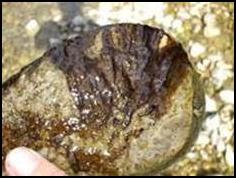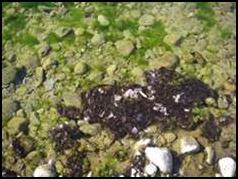Close eye on algae
Media Release
RELEASE: Thursday 2
February
www.gdc.govt.nz
Close eye on algae

Phormidium on rocks
Recent dry weather is having an adverse effect on river water levels around the district prompting Council to ask the public to look out for the algae, Phormidium.
“Phormidium is a naturally occurring algae, widespread throughout lakes and rivers around New Zealand, including those with very good water quality,” says acting environmental and regulatory group manager Lois Easton.
“We’re actively checking for blooms at monitoring sites, particularly in places where people swim, fish or where animals drink, because if it grows in large quantities it can pose a risk to health.”
Phormidium looks like a dark brown leathery mat that forms on rocks in stony river beds. Growth typically increases with low water flow during dry weather.
“The algae was found present in the Motu River during a study last summer, but without any decent rain it may be more noticeable in other rivers, streams and tributaries around the region too,” says Ms Easton.
“The algae is not always toxic but when it blooms in large quantities it can start to produce cyanotoxins that could be harmful to dogs, livestock and people.”
Dogs are attracted to its musty smell and it can be fatal to them if eaten. The algae mats can come loose and end up on riverbanks and shallow areas where animals are more likely to consume it.
People can also be at risk from illness if they come into contact or drink water with high concentrations of the algae in it.
“We want people to check out waterways, particularly on their own properties in places where people or animals regularly go and let us know if they find the algae.”
Mayor Meng Foon says observation and awareness from locals is important. “Please be alert and keep children and animals away from the algae if you find it and let Council know.”
Council staff will continue to monitor routine sites closely for any risk to public health.

Phormidium floating
mat
If you think you’ve found Phormidium:
• Contact Council on 0800 653 800 with the location.
• If you can, send a photo to service@gdc.govt.nz
• If you find a large amount of algae, don’t drink from or make contact with the water. Keep animals away.
• If animals display symptoms like lethargy, muscle tremors, fast breathing, twitching, paralysis, convulsions, contact a vet immediately.
• If you think you’re experiencing reactions, contact a doctor.
ENDS


 Gordon Campbell: On Why The Regulatory Standards Bill Should Be Dumped
Gordon Campbell: On Why The Regulatory Standards Bill Should Be Dumped PSA: Sunday Rally To Protest Outrageous Suspension Of 38 Disability Workers
PSA: Sunday Rally To Protest Outrageous Suspension Of 38 Disability Workers NZDF: 1st NZSAS Regiment Marks 70th Anniversary
NZDF: 1st NZSAS Regiment Marks 70th Anniversary Choose Clean Water: Changes To Fish & Game Continue Coalition’s Handover Of Power To Polluters
Choose Clean Water: Changes To Fish & Game Continue Coalition’s Handover Of Power To Polluters Inland Revenue Department: Tax Assessment Period A Prime Time For Scams, Expert Warns
Inland Revenue Department: Tax Assessment Period A Prime Time For Scams, Expert Warns Students Against Dangerous Driving: SADD And AA Celebrate 40 Years Of Tackling Youth Harm On NZ Roads
Students Against Dangerous Driving: SADD And AA Celebrate 40 Years Of Tackling Youth Harm On NZ Roads NZ Labour Party: Timid Tariff Response Fails New Zealanders
NZ Labour Party: Timid Tariff Response Fails New Zealanders


